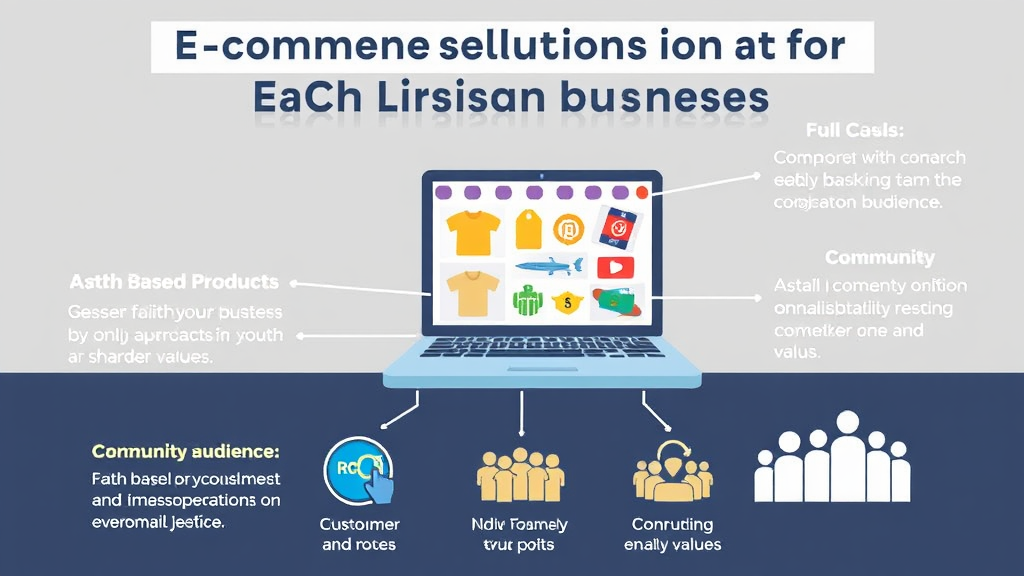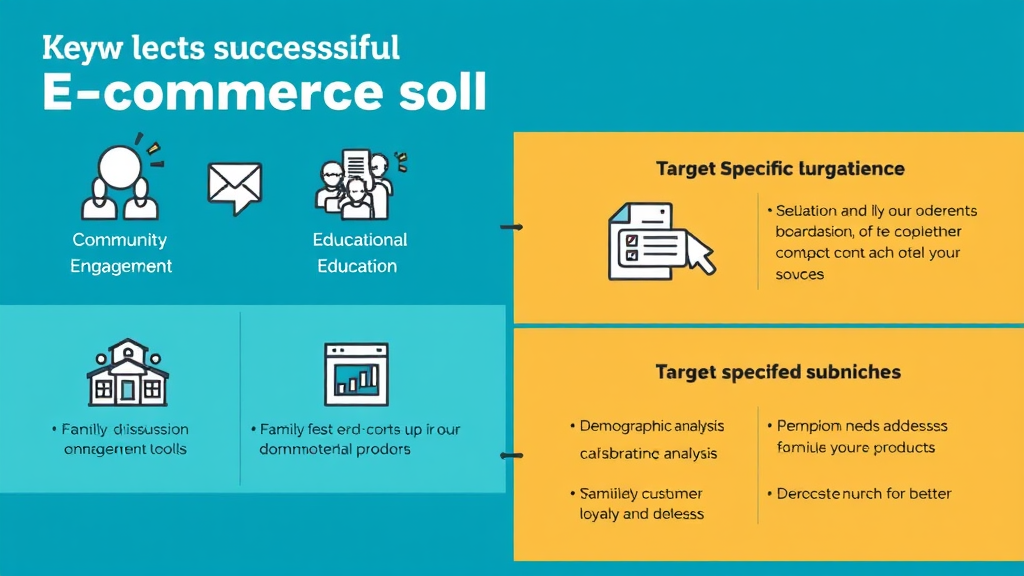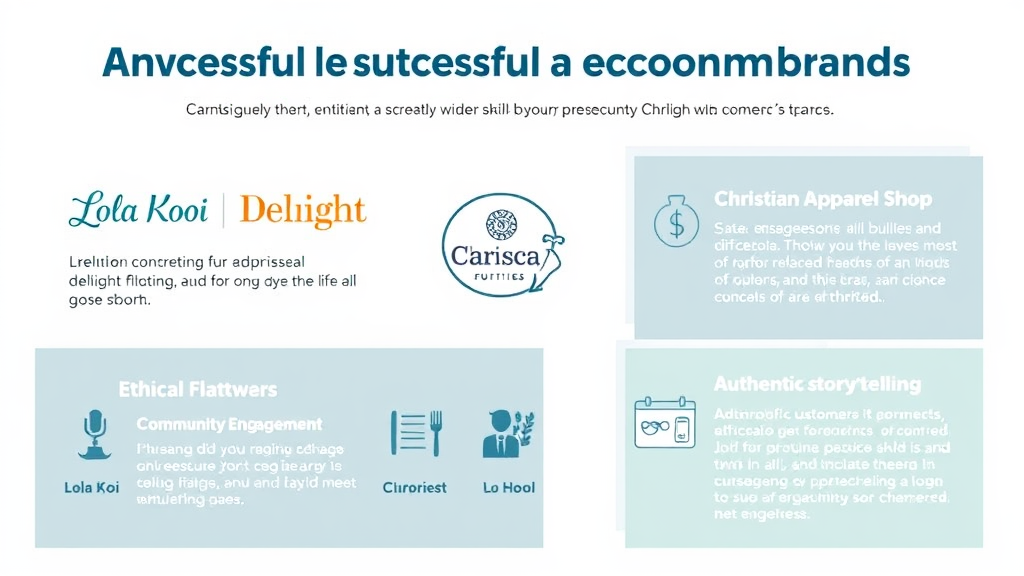Creating effective e-commerce solutions for Christian businesses online involves understanding the unique needs of this niche market. The focus on community connection, faith-based products, and strategic management tools can elevate the online shopping experience while also driving sales.
Key Takeaways
- Unique Needs: E-commerce solutions for Christian businesses must address community, faith-focused content, and easy management tools.
- Targeting Specific Niches: Identifying sub-niches within the Christian market can attract more focused audiences.
- Comprehensive Platforms: Tools like CMS, E-CMS, CRM, EMS, and LMS are essential for managing content, outreach, events, and learning.
- Successful Examples: Brands like Lola Kooi and Delight Flatware illustrate varied approaches to catering to the Christian community.
- Community Engagement: Utilizing platforms for outreach and engagement with customers fosters authenticity and loyalty in marketing strategies.
If you’re interested in improving your e-commerce strategy, check out ipsom.io.
Overview of E-Commerce Solutions for Christian Businesses
Creating effective e-commerce solutions for Christian businesses requires a deep understanding of the market. The focus should be on establishing a significant online presence that resonates with faith-based audiences. Integrating community-driven strategies fosters a sense of belonging, encouraging customer loyalty.
The Christian e-commerce landscape emphasizes connecting with communities that share similar values. Offering products that reflect the principles of faith can significantly impact customer engagement and sales. Brands aiming for success must focus on authenticity, ensuring that their message aligns with the beliefs and values of their target audience.
Choosing e-commerce is particularly beneficial for Christian businesses. It provides accessibility to faith-based products for customers who may not have local options. The growing trend of online shopping demonstrates that consumers increasingly prefer the convenience of purchasing products online. This transition opens new channels for reaching a broader audience and fulfilling the spiritual needs of customers anywhere, anytime.
Comprehensive E-Commerce Platforms
To effectively cater to Christian businesses, comprehensive e-commerce platforms are essential. These platforms streamline various aspects of operations, ensuring that the unique needs of the Christian market are met. By integrating different systems, businesses can enhance user experience while efficiently managing their online presence.
Content Management System (CMS)
-
A robust Content Management System (CMS) is vital for any e-commerce platform.
-
Key features:
- Unlimited admin access for easy management.
- Multi-level structures for organizing pages effectively.
- Social network integration to connect with audiences across platforms.
-
Benefits of a Well-Implemented CMS:
- Streamlined content creation and management.
- Increased user engagement through quick updates like blogs or product information tailored to the Christian audience.
E-Commerce Management System (E-CMS)
An effective E-Commerce Management System (E-CMS) handles various financial transactions seamlessly. Essential components include:
- Support for payment processing options like:
- AuthorizeNet
- PayPal (without additional fees)
- Store management features:
- Create unlimited stores with unlimited products and customers.
- Additional features:
- Promotional codes and gift certificates to boost sales.
- A centralized dashboard for donor and transaction management for easier tracking of financial aspects crucial to Christian businesses.
Relationship Management (CRM)
A solid Customer Relationship Management (CRM) system is essential for understanding customers. Key capabilities include:
- Advanced profiling and tracking to enhance communication and user interaction.
- Mass messaging integration for reaching audiences via email, text, and voice effectively.
- Automated workflows streamline communication, making customers feel valued and engaged, fostering community loyalty within the Christian market.
Event Management System (EMS)
An effective Event Management System (EMS) significantly enhances community engagement. Features include:
-
Tools for event promotion and registration to publish events and manage ticketing efficiently.
-
Volunteer recruitment functionalities to mobilize community support.
-
Benefits of an EMS:
- Strengthens community ties through event participation.
- Develops deeper connections with audiences, enhancing the brand's mission.
Learning Management System (LMS)
A Learning Management System (LMS) is crucial for businesses offering educational resources. Key attributes include:
-
Ability to manage interactive courses and certification processes.
-
Support for various formats, enabling the delivery of diverse learning materials (e.g., video lectures, written content).
-
Impact of an LMS:
- Meets the spiritual and educational needs of the community.
- Provides a holistic approach to the e-commerce strategy for Christian businesses.
Key Features of Successful E-Commerce Solutions
Outreach Management Tools
- Essential for Community Connection: Outreach management tools help build a strong community connection.
- Facilitates Interaction:
- Discussion Boards: Encourage user engagement and sharing of experiences.
- Prayer Request Management: Enhances interaction among users, fostering a sense of belonging.
- Educational Content:
- Custom Tools: Implement tools like Bible Generators to share faith-based educational material.
- Promotes Aligned Products: Supports products that resonate with the values of the community.
- Encouraging Interaction and Feedback: Incorporating features that promote user interaction warms customer relationships and enhances loyalty.
Identifying Target Niches
- Understanding Broad Terms: Recognizing that the term “religious people” is too broad is key for success.
- Focus on Specific Sub-Niches:
- Christian Education: Tailored products that cater to education within the faith community.
- Family-Oriented Products: Items that appeal specifically to families with religious values.
- Charity-Driven Items: Highlighting products that support charitable causes.
- Demographic Analysis: Successful brands analyze customer demographics for tailored offerings.
- Addressing Customer Pain Points:
- Creating solutions that genuinely meet market needs enhances customer satisfaction.
- This focused approach drives sales and builds a loyal customer base that feels understood and valued.
Case Studies of Successful Christian E-Commerce Brands
Examples of Successful Brands
Successful Christian e-commerce brands serve as inspirational case studies for aspiring online retailers. Here are a few noteworthy examples:
-
Lola Kooi:
- A beauty brand that integrates charitable partnerships.
- Strong community focus builds trust among consumers who value ethical practices.
- Drives sales through socially responsible initiatives.
-
Delight Flatware:
- Offers practical products for children with religious connections.
- Aligns with values that resonate deeply with parents seeking faith-centered items.
-
Christian Apparel Shop:
-
Capitalizes on humor and relatability to engage varied demographics within the faith community.
-
Emphasizes strong authentic storytelling and consistent community engagement.
-
Fosters brand loyalty and trust through genuine connections.
These brands illustrate how product relevance and authentic connections can significantly elevate customer engagement.
Lessons from Brand Success
The lessons from these brands highlight key strategies for success in the Christian e-commerce space:
-
Understand Audience Demographics:
- Tailor products to meet the specific needs of target customers.
-
Engaging Website Designs:
- Create visually appealing and user-friendly websites.
- Encourage longer visits and increased sales.
-
Effective Use of Social Media:
-
Enhance brand visibility through active social media engagement.
-
Foster two-way communication to build a community around shared values.
- Establish Feedback Loops:
- Regular interactions with customers generate valuable insights.
- Use feedback for continuous improvement and innovative product development.
By adopting these strategies, new Christian e-commerce businesses can build a strong foundation for long-term success.
Building Community and Engagement
Importance of Community Engagement
- Community Engagement: Vital for Christian e-commerce businesses.
- Building Connections: Fosters trust and loyalty among customers.
- Use of Social Media: Powerful tools for enhancing customer interaction, including:
- Posting engaging content
- Responding to comments
- Initiating conversations around faith-based topics
- Authentic Storytelling: Deepens connections by resonating with the audience's values and beliefs.
Engagement Tools and Strategies
- Discussion Boards: Encourage sharing of experiences and open dialogue.
- Prayer Request Management Tools: Provide a space for customers to seek support and share requests.
- Community-Focused Resources: Enhance customer relationships and sense of belonging.
Benefits of a Strong Community
- Feeling Valued: Customers who feel part of a community are more likely to make repeat purchases.
- Increased Engagement: A supportive community encourages active participation.
Resources and Support
- Robust Support Systems: Essential for maintaining community ties.
- Follow-Ups Post-Purchase: Enhance customer experience and encourage feedback.
- Effective Customer Service: Promptly addressing concerns increases customer satisfaction.
Utilizing Technology for Engagement
- MinistryPlatform:
- An all-in-one tool for managing engagement strategies efficiently.
- Streamlines interactions, manages community events, and facilitates communication.
Conclusion
- Combining Technology with Heartfelt Approaches: Creates a vibrant community that aligns with the principles of faith, enhancing the overall e-commerce experience.
Strategic Recommendations for E-Commerce Success
Recommendations for New Store Owners
New store owners should pursue ideas that reflect their passion and authenticity. This connection helps forge a deeper relationship with potential customers. Utilizing personal narratives creates powerful storytelling opportunities, making the brand relatable and memorable. Engaging with customers on social media is essential for gathering feedback and generating new ideas. Regular interaction helps in understanding customer needs and preferences, fostering a community around the brand.
Effective Use of Technology
Leveraging technology is vital for streamlining business management. Applications can facilitate data management, event planning, and donation handling, enhancing operational efficiency. It’s important to stay updated with evolving tools to improve website functionality and user experience. Using integrated platforms can improve customer interactions and ensure data consistency. Additionally, investing in automation tools can free up time for strategic tasks, allowing store owners to focus on growth and community engagement.
FAQ
What specific features should I look for in an e-commerce platform for my Christian business?
When selecting an e-commerce platform for your Christian business, look for features tailored to community engagement and faith-based interactions. Essential features include multi-store management, allowing you to showcase various product categories, and donation tracking to support church missions. Additionally, consider integrated payment options like PayPal or AuthorizeNet for seamless transactions. An effective content management system (CMS) helps streamline your content and maintain an active online presence.
How can I effectively identify and target a niche within the Christian market?
To identify a niche in the Christian market, conduct thorough market research to understand your target audience's needs and interests. Use tools like Google Trends or social media analytics to uncover specific sub-niches, such as Christian apparel for youth or faith-based educational resources. Engage with your community through surveys or discussions to gather feedback and tailor your offerings to meet these precise demands.
What are common challenges associated with running an e-commerce business focused on religious products?
Running an e-commerce business focused on religious products can present challenges such as maintaining authenticity while appealing to a broad audience. Unique inventory management needs often arise due to varying product lines, including educational materials, devotional items, and apparel. Additionally, navigating online marketing strategies can be tricky, as they must align with your faith-based values while remaining competitive.
How can I leverage social media to enhance my online store's presence?
Leverage social media by engaging with your audience through authentic storytelling about your products and mission. Create meaningful content such as prayer requests, community-driven posts, and testimonials to foster connections. Utilizing platforms like Instagram and Facebook, showcase your products through visually appealing posts and encourage community engagement with polls and discussions. Additionally, collaborate with influencers within the Christian niche to reach wider audiences.
What tools are available for managing community outreach and engagement?
Several tools can enhance your community outreach and engagement, such as email marketing platforms for newsletters and event promotions. Discussion boards and social media groups can facilitate interactions among your audience. Utilizing CRM systems can help track user interactions and support effective communication. Platforms like MinistryPlatform offer comprehensive management solutions designed specifically for faith-based organizations.
Can I integrate a Learning Management System with my e-commerce platform?
Yes, you can integrate a Learning Management System (LMS) with your e-commerce platform to provide educational resources alongside your products. This integration allows for the delivery of interactive courses, workshops, and video content related to your faith-based offerings. Ensure that the LMS you choose supports e-commerce functionalities to facilitate seamless transactions for course enrollments.
What marketing strategies work best for Christian e-commerce brands?
Successful marketing strategies for Christian e-commerce brands include leveraging social media for community-building and sharing authentic narratives about your mission. Use content marketing to create valuable resources such as blogs or podcasts that resonate with your audience. Engage in partnerships with churches and organizations to promote your products, and utilize email marketing to keep customers informed about new arrivals, promotions, and events.
How do I ensure that my brand maintains authenticity and resonates with the Christian audience?
To maintain authenticity, stay true to your core values and mission from the outset. Communicate openly with your audience about your faith-based initiatives and product origins. Sharing customer stories and testimonials can also help strengthen connections and trust. Regularly seek feedback from your community, allowing their insights to guide your offerings while ensuring your brand's message remains relevant and impactful.





